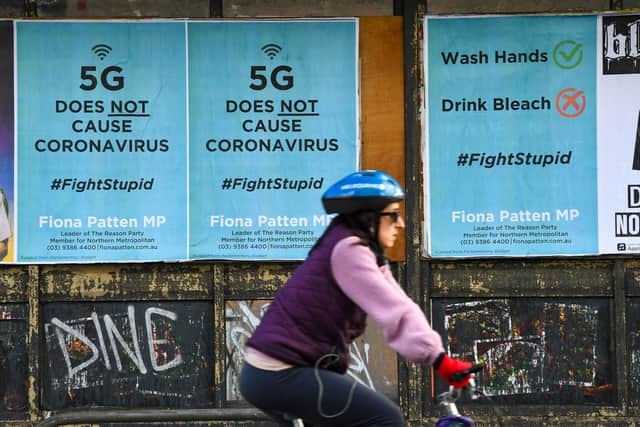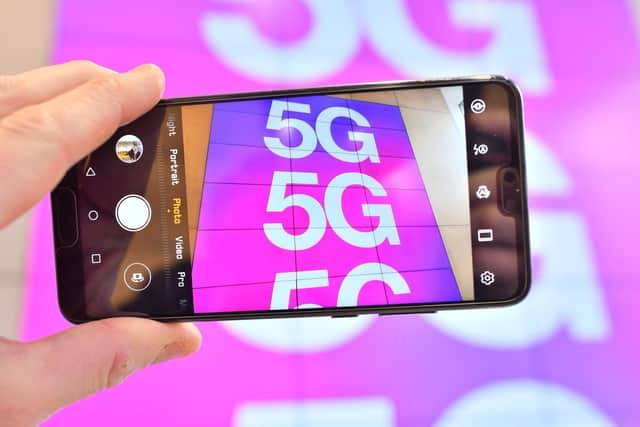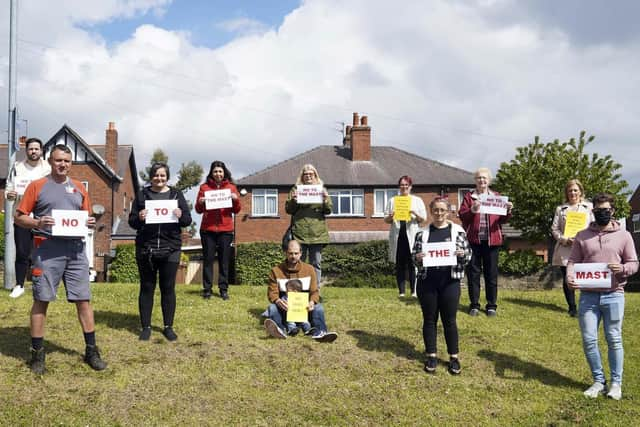The power of 5G conspiracy theories and why government language is important
and live on Freeview channel 276
5G won't make your head bleed, your eyes turn red or make your feet fall off.
There is also no evidence whatsoever that it causes cancer.
But none of that has stopped whacky and weird conspiracy theories taking hold in people's minds and on vast swathes of the internet.
Advertisement
Hide AdAdvertisement
Hide Ad

No amount of reason or solid scientific research can dissuade some people from the view that an extra fast phone signal will bring about an apocalypse of some kind.
The emergence of flyers containing baseless and inaccurate claims about 5G, as well as other leaflets spouting nonsense about the Covid jab, around Wakefield this week, is proof that these theories are not disappearing.
If anything they're getting more traction.
Locally, it's quite possible that none of this was overly helped by the government's own Planning Inspectorate insisting that a 5G a mast must be built on Dewsbury Road in Wakefield, as it did before Christmas.


The decision overturned the original call by Wakefield Council' s own planning team, who'd denied planning permission for the mast because it would be an eyesore at odds with the area's character.
It was an assessment most local people agreed with.
Advertisement
Hide AdAdvertisement
Hide AdBut in the Inspectorate's ruling, they suggested the mast was essential and that "The need for an electronic communications system should not be questioned."
To give added and important context, the Inspectorate was quoting national policy by saying that, as it is required to do to explain its decision.


Electronic communication systems would include radio masts, TV aerials and broadband cables, which most of us would all consider modern daily essentials we need to live and work.
But should 5G really be bracketed with much older and established infrastructure like that, when most of the UK haven't even got that kind of signal coverage yet?
Advertisement
Hide AdAdvertisement
Hide AdAnd without wanting to sound like a Luddite, do we really NEED it? Do our phones HAVE to upload that YouTube video half a second faster while we wait for the bus?
In 20 years time, the answer will admittedly, probably be a yes.


Most people would regard swapping modern broadband speeds for their early 2000s dial-up internet connection with horror (browsing before 6pm on a weekday was a big 'no' kids), even though at the time it was a choice rather than a necessity.
And there is a strong argument to say that 5G is vital for places like Wakefield, so it can attract businesses and avoid falling behind Leeds on connectivity.
Advertisement
Hide AdAdvertisement
Hide AdBut none of that was disputed by the council's planning team when they rejected the mast.
And the Inspectorate's language in overturning that call, formulaic though it may have been, isn't a great look when the government knows there is all sorts of daft and harmful talk about 5G doing the rounds.
Using phrases like it "shouldn't be questioned" looks, whether quoting planning policy or not, a tad sinister, even if it wasn't meant like that.
The whole point of the planning process is that people should have a say in what happens in their own communities and question whether or not new homes, warehouses and supermarkets should be built.
It is one of the most vital democratic functions we have.
Advertisement
Hide AdAdvertisement
Hide AdThe government would of course strongly dismiss the idea that it was riding roughshod over that.
The Inspectorate itself fulfils a very important check-and-balance process for the planning system, ensuring that ordinary people and businesses aren't being wrongly done to by their local councils.
But people have a right to question anything.
There is nothing wrong with people asking searching questions of the experts about 5G, or being sceptical about it. It is new technology afterall, and not everyone has to be a cheerleader for it.
Where a tiny minority cross the line is when barefaced lies are spread, vulnerable folk are taken in by it and people who disagree are abused and threatened with violence.
Advertisement
Hide AdAdvertisement
Hide AdAs shown by the false Jimmy Savile accusations peddled in Parliament recently, language is everything.
Words from authority figures carry huge weight and have consequences.
Against the backdrop of a society struggling constantly with misinformation and fake news, the government needs to do more to tackle nonsense peddlers.
In this context, whether you agree with the decision or not, the Inspectorate's choice of words was perhaps not its finest hour.
Local Democracy Reporting Service